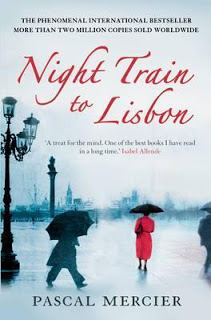Reading Time: 3 minutesWilling to settle for a quiet Sunday night movie about a Swiss professor who breaks out of his staid routine and has a life changing experience, we ended up with so much more, watching ‘Night train to Lisbon’, a 2013 movie that is both profound and engrossing.
‘Night train to Lisbon’ is based on an international best selling book of the same name, first published in German in 2004. The author of the book is Pascal Mercier, the nom de plum of Peter Bieri, an outstanding scholar, philosopher and word-smith, who apart from his academic writing has written four novels, which not surprisingly explore philosophical questions. An online customer’s review of the ‘Night train to Lisbon’ book described it as ‘a magical mystery tour through the meaning of life’. That is certainly how it felt to me.

The film tells the story of Raimund Gregorius a high school teacher of classical languages in Bern, Switzerland, whose dull, routine dominated life is turned upside down when he saves a young Portuguese woman intent on suicide. He comes into possession of a Portuguese book by Amadeu de Prado titled ‘A goldsmith of words’. The book is a collection of notes by de Prado, and it’s author turns out to be a Portuguese doctor, great thinker, and opponent of the right wing dictatorship of António de Oliveira Salazar. De Prado’s notes captivate Gregorius, make him aware of life’s possibilities, and motivate him to leave his life in Bern to discover more about the mysterious De Prado. The sprinkling of quotes from De Prado’s book throughout the telling of Gregorius’ story has been described as a ‘literary reflection of Peter Bieri’s philosophical works’. This interweaving of philosophy into cinematic drama is particularly effective, and makes me want to watch the film at least once more. The author’s creation of De Prado and his book is so convincing that opinions expressed on social media remain divided as to whether there was a De Prado who wrote ‘A goldsmith of words’.
When Gregorius travels to Lisbon he meets De Prado’s relatives and friends from his activist days in the 60s and 70s. Their stories and memories are depicted in flashbacks, which rather than distracting, as flashbacks often do, add a second and possibly more interesting layer of story. The people Gregorius meets and their stories of love, ethics, hate, envy, mortality, life’s turning points, betrayal, and rebellion against dictatorship serve to invite De Prado (or is it, Peter Bieri) to offer his views.
There are many outstanding actors in both the current and past stories told by the film. However, two stand out, perhaps by virtue of their familiarity, their presence or their stature. Jeremy Irons is perfectly cast as Raimund Gregorius. Iron’s readings of De Prado’s book brings back fond memories of his narration in the unforgettable 1982 TV series ‘Brideshead Revisited’. De Prado’s possessive and protective sister, Adriana de Prado, is played by Charlotte Rampling, who once again seems to become the character she portrays.
The film’s setting in Bern, Lisbon and Spain, served to enhance the film visually, while peeks into the not so well known (to many of us) political struggles of early 1970s Portugal are likely to stir interest to learn more about about Salazar’s dictatorship and his overthrow.
(Visited 163 times, 1 visits today)
